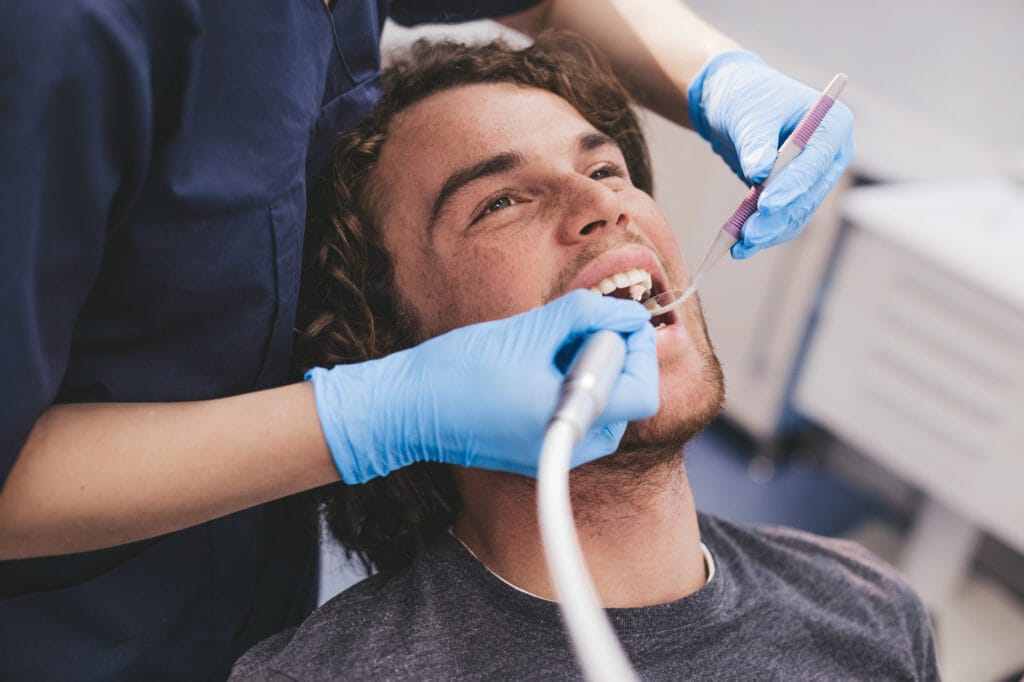Sports-related injuries are a common—though unfortunate—part of athletic activity. While it’s impossible to eliminate all risks, there are several steps athletes can take to significantly reduce their chances of experiencing dental trauma.
Here’s what you need to know.
Common Types of Sports Dental Injuries
Dental injuries in sports typically occur from direct impact to the mouth and are especially common in contact sports. Here are the most frequent types of injuries:
- Fractures: These are categorized into crown and root fractures.
- Crown fractures are the most common and range in severity:
- Enamel fractures affect only the tooth’s surface.
- Enamel-dentin fractures reach the second layer.
- Complicated fractures extend to the pulp.
- Root fractures occur below the gum line and can be hard to detect, with pain sometimes delayed.
- Crown fractures are the most common and range in severity:
- Tooth Intrusions: When a tooth is pushed into the jawbone, it can damage not only the tooth but also the jawbone and nerves. This is a serious injury requiring immediate care.
- Tooth Displacement & Avulsion: A tooth can be knocked loose, moved, or completely dislodged. These are dental emergencies that demand prompt action.
- Tooth Bruising: Less severe than the others, this causes discoloration and sensitivity. Fortunately, most bruised teeth heal with time.
Immediate Steps After a Sports Dental Injury
Your response should match the type of injury, but in almost every case, emergency dental care is essential:
- For fractured teeth: Avoid hard or extreme temperature foods. See your dentist as soon as possible.
- For displaced teeth: Don’t attempt to move the tooth yourself. Get to your dentist immediately.
- For knocked-out teeth: Handle by the crown (not the root), gently rinse with tap water, and try to reposition it in the socket. If that’s not possible, place it in cold milk and see an emergency dentist right away—often, the tooth can still be saved.
- For bruised teeth: Rest and avoid chewing on that side. Over-the-counter pain relief can help, but still consult your dentist to assess the damage.
The Importance of Protective Equipment
Helmets are essential for many contact sports—but don’t stop there. Mouthguards are crucial in both contact and non-contact sports to protect your teeth from trauma.
At Affinity Dental, we strongly recommend custom-fitted mouthguards. Unlike generic ones from the store, custom guards are made to fit your unique bite, offering the best comfort and protection.
Recovery & Treatment Options
Dental injury treatments vary by type and severity:
- Minor fractures may only need bonding or crowns.
- Injuries reaching the pulp typically require root canals.
- Intrusions might resolve naturally—especially in children—but severe cases may need orthodontic correction or surgery.
- Knocked-out permanent teeth are usually reinserted and stabilized using a splint that attaches to nearby teeth.
Prevention Tips for Athletes and Coaches
Preventing injuries is a shared responsibility:
- Athletes should always wear the right protective gear, including a mouthguard.
- Coaches must emphasize safety and proper techniques during practice and games.
- Both should stay educated on how to respond to dental emergencies.
Just by reading this article, you’re already a step ahead.
Protect Your Smile: Visit Affinity Dental
At Affinity Dental, we’re here to help you protect your smile—on and off the field. Whether you need a custom mouthguard, advice on dental injury prevention, or emergency care after an incident, we’ve got you covered.
Don’t let a split-second sports mishap lead to long-term dental issues. Book a visit with Affinity Dental today, and take the next step toward a safer, healthier smile.
